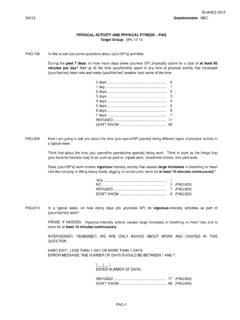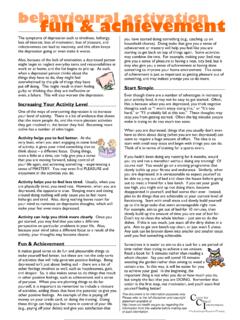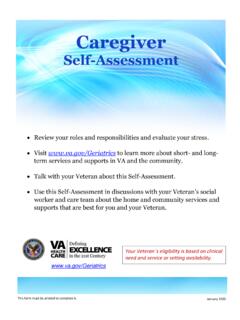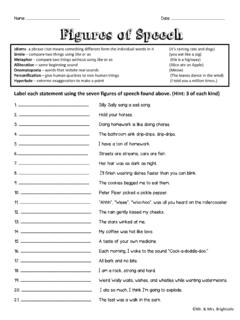Transcription of Global Physical Activity Questionnaire (GPAQ)
1 1 Global Physical Activity Questionnaire (GPAQ) WHO STEP wise approach to NCD risk factor surveillance Surveillance and Population-Based Prevention Prevention of Noncommunicable Diseases Department World Health Organization 20 Avenue Appia, 1211 Geneva 27, Switzerland For further information: 2 GPAQ Physical Activity Next I am going to ask you about the time you spend doing different types of Physical Activity in a typical week. Please answer these questions even if you do not consider yourself to be a physically active person. Think first about the time you spend doing work. Think of work as the things that you have to do such as paid or unpaid work, study/training, household chores, harvesting food/crops, fishing or hunting for food, seeking employment.
2 [Insert other examples if needed]. In answering the following questions 'vigorous-intensity activities' are activities that require hard Physical effort and cause large increases in breathing or heart rate, 'moderate-intensity activities' are activities that require moderate Physical effort and cause small increases in breathing or heart rate. Questions Response Code Activity at work 1 Does your work involve vigorous-intensity Activity that causes large increases in breathing or heart rate like [carrying or lifting heavy loads, digging or construction work] for at least 10 minutes continuously? [INSERT EXAMPLES] (USE SHOWCARD) Yes 1 P1 No 2 If No, go to P 4 2 In a typical week, on how many days do you do vigorous-intensity activities as part of your work?
3 Number of days P2 3 How much time do you spend doing vigorous-intensity activities at work on a typical day? Hours : minutes : hrs mins P3 (a-b) 4 Does your work involve moderate-intensity Activity that causes small increases in breathing or heart rate such as brisk walking [or carrying light loads] for at least 10 minutes continuously? [INSERT EXAMPLES] (USE SHOWCARD) Yes 1 P4 No 2 If No, go to P 7 5 In a typical week, on how many days do you do moderate-intensity activities as part of your work? Number of days P5 6 How much time do you spend doing moderate-intensity activities at work on a typical day? Hours : minutes : hrs mins P6 (a-b) Travel to and from places The next questions exclude the Physical activities at work that you have already mentioned.
4 Now I would like to ask you about the usual way you travel to and from places. For example to work, for shopping, to market, to place of worship. [insert other examples if needed] 7 Do you walk or use a bicycle (pedal cycle) for at least 10 minutes continuously to get to and from places? Yes 1 P7 No 2 If No, go to P 10 8 In a typical week, on how many days do you walk or bicycle for at least 10 minutes continuously to get to and from places? Number of days P8 9 How much time do you spend walking or bicycling for travel on a typical day? Hours : minutes : hrs mins P9 (a-b) Recreational activities The next questions exclude the work and transport activities that you have already mentioned.
5 Now I would like to ask you about sports, fitness and recreational activities (leisure), [insert relevant terms]. 10 Do you do any vigorous-intensity sports, fitness or recreational (leisure) activities that cause large increases in breathing or heart rate like [running or football,] for at least 10 minutes continuously? [INSERT EXAMPLES] (USE SHOWCARD) Yes 1 P10 No 2 If No, go to P 13 11 In a typical week, on how many days do you do vigorous-intensity sports, fitness or recreational (leisure) activities? Number of days P11 12 How much time do you spend doing vigorous-intensity sports, fitness or recreational activities on a typical day? Hours : minutes : hrs mins P12 (a-b) Continued on next page 3 GPAQ, Continued Physical Activity (recreational activities) contd.
6 Questions Response Code 13 Do you do any moderate-intensity sports, fitness or recreational (leisure) activities that causes a small increase in breathing or heart rate such as brisk walking,(cycling, swimming, volleyball)for at least 10 minutes continuously? [INSERT EXAMPLES] (USE SHOWCARD) Yes 1 P13 No 2 If No, go to P16 14 In a typical week, on how many days do you do moderate-intensity sports, fitness or recreational (leisure) activities? Number of days P14 15 How much time do you spend doing moderate-intensity sports, fitness or recreational (leisure) activities on a typical day? Hours : minutes : hrs mins P15 (a-b) Sedentary behaviour The following question is about sitting or reclining at work, at home, getting to and from places, or with friends including time spent [sitting at a desk, sitting with friends, travelling in car, bus, train, reading, playing cards or watching television], but do not include time spent sleeping.
7 [INSERT EXAMPLES] (USE SHOWCARD) 16 How much time do you usually spend sitting or reclining on a typical day? Hours : minutes : hrs min s P16 (a-b)
















